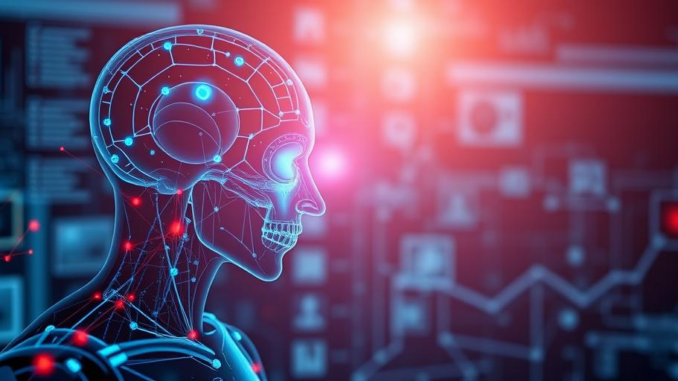
Summary
A new AI hub in Geneva seeks to transform neuromodulation and healthcare. It combines the efforts of leading organizations to improve treatment and prevention of neurological and psychiatric disorders. This collaboration aims to accelerate innovation and deliver cutting-edge therapies.
Start with a free consultation to discover how TrueNAS can transform your healthcare data management.
** Main Story**
So, Geneva’s about to become a hotbed for AI in healthcare. I mean, seriously, who saw that coming, right? Jokes aside, the city is launching a groundbreaking AI hub dedicated to healthcare and, specifically, neuromodulation, sometime in the second half of 2025. That’s not too far away. This initiative? It’s a pretty huge deal, marking a giant leap in how we use AI to tackle neurological and psychiatric disorders. We’re talking about better treatments and even preventative measures.
The collaboration itself is impressive. You’ve got the University Hospitals of Geneva (HUG), the Department of Health and Mobilities (DSM) of the Canton of Geneva, and the Wyss Center for Bio and Neuro Engineering all teaming up. Their mission? To unlock the power of AI and create cutting-edge treatments for patients battling these really debilitating conditions. It’s ambitious, but I think they can pull it off. They kind of have to.
A Collaborative Approach to Innovation
Picture this: a 1,000 m² space, right at the entrance of Campus Biotech on the Sécheron site. That’s where the AI hub will call home. It’s a prime location, known for sparking collaboration between experts in new technologies. Plus, being managed by HUG, the hub will draw on AI expertise from both the hospital and the tech industries.
Speaking of collaboration, this approach is key. It’s about leveraging the strengths of each partner, speeding up the development and rollout of AI solutions for patient care. Oh, and the HUG Innovation Center? They’ll be playing a crucial role, too. Robert Mardini, the Director General of HUG, says it best, emphasizing the hub’s unique environment designed to bring together the necessary expertise. And let’s not forget Campus Biotech itself. They’re creating a synergy between tech experts and those who really need them.
Four Key Missions
Alright, let’s break down what this AI hub is actually going to do. There are four main areas of focus:
-
Patient Care: First up, HUG and the Wyss Center will be handling patient admissions, follow-up appointments, and medical investigations. It’s a comprehensive approach. Staff from HUG’s Department of Psychiatry and Department of Clinical Neurosciences will be working closely with the Wyss Center’s AI-guided neuromodulation program. The goal? Personalized care tailored to each patient. I think that is the future, don’t you?
-
AI-Driven Neuromodulation: Next, they’re diving deep into innovative neuromodulation therapies guided by AI. This is where things get really interesting. The potential for treating a wide range of neurological and psychiatric conditions is enormous. You just have to look at what they have done so far to see that.
-
Research and Development: Of course, the hub will also serve as a center for R&D, pushing the boundaries of AI in healthcare. This means developing new algorithms, improving existing technologies, and exploring new ways AI can be used in neuromodulation. You can’t just be happy with the status quo. The world moves on.
-
Training and Education: Finally, they’re investing in the future by providing training and education in AI and neuromodulation. It’s all about equipping the next generation of healthcare providers with the knowledge and skills they need to effectively use these tools. I once tried to teach myself AI, but I just couldn’t get it. So this is really needed, in my opinion.
The Promise of AI
Let’s be real, this hub is a reflection of how AI is changing healthcare. AI’s already popping up everywhere, from spotting diseases early to creating personalized treatment plans. I saw a demo the other day where AI algorithms were assisting in analyzing medical images. Pretty crazy stuff. And, of course, AI-powered chatbots are streamlining patient interactions, making it easier to get quick assessments and recommendations. It’s like, finally, we’re starting to see the potential come to life.
Neuromodulation: A Second Chance
Now, let’s talk neuromodulation. It’s basically using electrical or pharmaceutical stimulation to tweak nerve activity. And guess what? It’s making a comeback! You’re seeing positive results for things like chronic pain, depression, even Alzheimer’s and epilepsy. The Geneva AI hub wants to take it even further, using AI to personalize treatments and improve outcomes. It’s a big step towards precision medicine, where treatments are specifically tailored to each patient’s needs. Plus, they’ll be supporting research and trials on neuromodulation, especially how it can help with treatment-resistant depression.
A Future Driven by AI
Look, the Geneva AI hub? It’s a serious investment in healthcare’s future. It’s bringing together top experts, fostering collaboration, and focusing on cutting-edge tech. Ultimately, it’s poised to make a real difference in how we treat and prevent neurological and psychiatric disorders. This initiative fits right into the overall trend of AI playing a bigger and bigger role in improving patient outcomes and transforming healthcare delivery. And with its focus on research, development, and education, the hub is setting itself up to be a major player in driving innovation in AI-driven healthcare. As AI continues to evolve, initiatives like this will be vital in turning its potential into real benefits for patients around the world. In short, its very exciting.


The focus on personalized care is intriguing. Could the hub’s AI algorithms potentially identify novel biomarkers or predictive indicators that might currently be overlooked in traditional diagnostic approaches for neurological disorders?
That’s a great point! The potential for AI to uncover hidden biomarkers is really exciting. Imagine how much earlier we could detect and treat neurological disorders if we could identify those subtle indicators sooner. This could truly revolutionize preventative care and personalized treatment strategies.
Editor: MedTechNews.Uk
Thank you to our Sponsor Esdebe